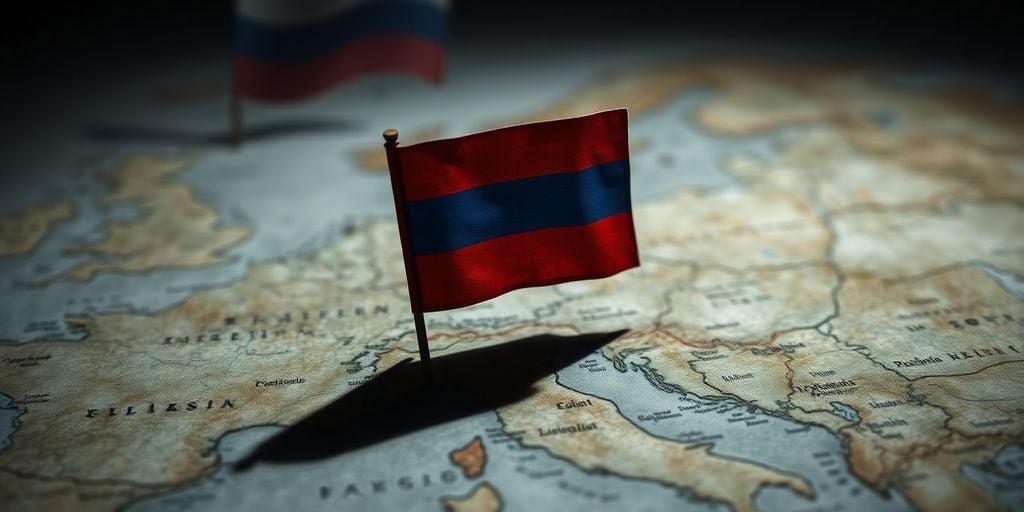Serbia’s escalating rhetoric and deepening pro-Russian ties are raising alarms across the Balkans, threatening to destabilize a region still recovering from past conflicts. Concerns are mounting over the actions of leaders like Milorad Dodik in Republika Srpska, whose defiance, backed by Moscow, risks reigniting ethnic tensions and undermining hard-won peace agreements.
A Brewing Storm in the Balkans
The Western Balkans, often dubbed Europe’s "powder keg," are once again at a critical juncture. The region’s geopolitical significance as an energy and security corridor linking Europe, the Middle East, North Africa, and the Caucasus makes any instability a concern for the wider international community. Despite economic resilience and foreign investment in sectors like automotive and IT, a significant brain drain continues to hamper development.
Key Takeaways
- Milorad Dodik, leader of Republika Srpska, continues to defy international peace efforts, maintaining power despite a criminal conviction.
- Dodik’s frequent meetings with Russian President Vladimir Putin highlight Moscow’s role in regional destabilization.
- His actions are seen as a direct challenge to the central Bosnian government and the Dayton Accords.
- Experts warn of escalating tensions and potential small-scale conflicts, though a full-scale return to violence is not widely anticipated.
The Echoes of the Past: Bosnia and Herzegovina
Bosnia and Herzegovina, a nation forged from the brutal inter-religious and inter-ethnic war of the 1990s, is particularly vulnerable. The 1995 Dayton Peace Agreement established two sub-state entities: the Federation of Bosnia and Herzegovina and the ethnically Serb Republika Srpska. Milorad Dodik, the current leader of Republika Srpska, has consistently advocated for independence, actively working to undermine Bosnia’s legitimate state structures.
In a dramatic turn, Dodik was sentenced to a year in prison and banned from public office for six years for refusing to comply with recommendations from the High Representative for Bosnia and Herzegovina, Christian Schmidt. Further escalating the crisis, Dodik signed legislation banning Bosnia and Herzegovina’s police and judiciary from operating within Republika Srpska, a move widely seen as an affront to Bosnia’s sovereignty and the Dayton Agreement.
Serbia’s Role and Russian Influence
Serbia, a neighbor with close ties to Dodik, is also contributing to the regional unease. Serbian President Aleksandar Vucic, facing domestic political challenges, may be using the crisis in Republika Srpska to divert attention. Russia, in turn, is leveraging its influence in Serbia and Republika Srpska, potentially using the region as a bargaining chip in broader geopolitical discussions, including peace negotiations over Ukraine.
Russia’s influence in the Western Balkans is rooted in its support for Serbia on the Kosovo issue, shared anti-Western narratives, and regional energy dependence. This influence is facilitated by local elites who often echo pro-Russian messaging. The EU’s slow and bureaucratic integration process has created a vacuum, allowing external powers like Russia and China to expand their presence.
The Path Forward
Policymakers in America and Europe are urged not to ignore the Balkans. The international community must remain vigilant and committed to preventing the kind of instability that led to war in the 1990s. While Europe is focused on Ukraine, there is a risk of overlooking the potential for conflict in the Balkans. The most effective response to Balkan instability is not top-down management from Brussels but active engagement from trusted regional actors and a renewed commitment to the region’s stability and European integration.
Sources
- Worrying Echoes of the Past in the Balkans, Hudson Institute.
- The Balkans: How to stabilize the ‘powder keg’ of Europe, The World Economic Forum.
- Fact vs. Fiction: Understanding Russia’s Influence in the Western Balkans, ISPI.
- Putin wants Western Balkans as his next ‘playground,’ UK warns – POLITICO, POLITICO.eu.
- Pro-Russian Leader’s Defiance Threatens Balkan Peace | Latest Balkan and Southeast European News, Independent Balkan News Agency.






